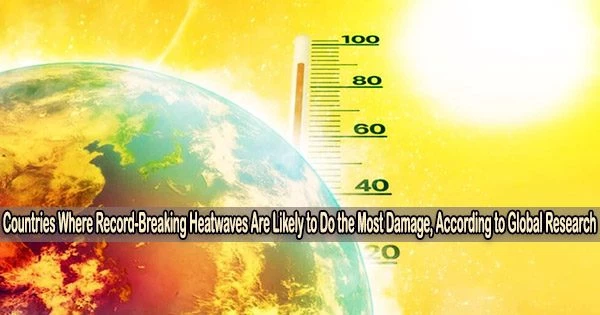A recent study has identified underdeveloped areas around the globe that are most susceptible to the destructive impacts of extreme heat.
According to study from the University of Bristol that was just published in Nature Communications, areas like Afghanistan, Papua New Guinea, and Central America are particularly at risk because of socioeconomic fragility and exceptional heat extremes.
Since adaptation measures are frequently only implemented after an event, countries that have not yet experienced the most intense heatwaves are frequently most vulnerable. The risks are increased by the likelihood of breaking temperature records, expanding populations, and insufficient healthcare and energy supplies.
Beijing and Central Europe are included on the list of hotspots as well, as millions of people would suffer if these heavily populated areas experienced record-breaking heatwaves.
The researchers are urging policy makers in high-risk areas to take appropriate steps to lower the probability of fatalities and other consequences from climate extremes in light of their findings.
Lead author, climate scientist Dr. Vikki Thompson at the University of Bristol Cabot Institute for the Environment, said: “As heatwaves are occurring more often we need to be better prepared. We identify regions that may have been lucky so far some of these regions have rapidly growing populations, some are developing nations, some are already very hot. We need to ask if the heat action plans for these areas are sufficient.”
Being prepared saves lives. We have seen some of the most unexpected heatwaves around the world lead to heat-related deaths in the tens of thousands. In this study, we show that such record smashing events could occur anywhere. Governments around the world need to be prepared.
Professor Dann Mitchell
The researchers identified regions worldwide where temperature records are most likely to be broken soon and the communities consequently in greatest danger of experiencing extreme heat using extreme value statistics, a method to estimate the return periods of rare events, and large datasets from climate models and observations.
The researchers also issued a warning that statistically improbable extremes, in which existing records are beaten by margins that looked unimaginably small before they really happened, could occur anywhere.
These unlikely events were found to have transpired in almost a third (31%) of the regions assessed where observations were deemed reliable enough between 1959 and 2021, such as the 2021 Western North America heatwave.
Co-author Dann Mitchell, Professor in Atmospheric Sciences at the University of Bristol Cabot Institute for the Environment, said:
“Being prepared saves lives. We have seen some of the most unexpected heatwaves around the world lead to heat-related deaths in the tens of thousands. In this study, we show that such record smashing events could occur anywhere. Governments around the world need to be prepared.”
Heatwaves are becoming more frequent, intense, and prolonged due to human-induced climate change, which could result in thousands more unnecessary deaths worldwide.
Prioritizing mitigation in the most susceptible areas can be achieved by increasing our understanding of the areas where society may not be prepared for climate extremes.
The University of Bristol became the first university in the UK to declare a climate emergency in 2019 in acknowledgement of the harmful effects of climate change, which were demonstrated by the work of its climate scientists.
















